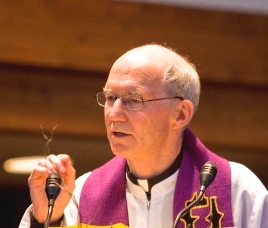|
Malachi gives us a glimpse of the future: the coming of the Lord to burn away evil and bring healing. It's a bit like our Battle Hymn of the Republic - "Mine eyes have seen the glory of the coming of the Lord." Although Malachi looks forward to the Lord's coming, he does not neglect the present. He shows deep concern for people's behavior today. For example, he tells husbands, "let none be faithless to the wife of his youth for I hate divorce, says the Lord God of Israel."
0 Comments
Homilia sobre las profecias de Malaquias y como se relacionan con los eventos en las Islas Filipinas - y nuestra respuesta.
Last week I concluded a four-part series on How to Pray. We saw that prayer begins with gratitude, but requires persistent intercession to continue and that it ultimately leads to an emptying, an outpouring of self.
This Sunday I want address a practical part of that outpouring - namely, that we return first fruits to God. My brother has a cherry tree that he prunes each year. It's a joy to see the first ripe cherries. By rights those cherries, those first fruits, belong to God. The Bible says, "Honor the Lord with your wealth and with the first fruits of all your produce; then your barns will be filled with grain, and your vats will overflow with wine." (Prov 3:9-10) Este domingo quisiera hablar de una parte practica de entregarse - que damos los primeros frutos a Dios. Mi hermano tiene un arbol de cerezo que apoda cada anyo. Es una alegria ver las primeras cerezas, los primeros frutos. Por derecho, ellas - las primicias - pertenecen a Dios. La Biblia dice, "Honra al Senor dandole lo que tienes, ofrecele las primicias de todos tus frutos. Entonces tus graneros seran llenos y rebosara el vino en tus lagares." (Prov. 3:9-10)
Esta es la cuarta y final homilia sobre como rezar. La semana pasada hemos aprendido la oracion del publicano: Jesus, ten piedad de mi. Hoy vemos a un publicano. Para entender el evangelio hay que entender que el publicano era un hombre odiado. A nadie le gusta pagar impuestos, pero el publicano era mucho mas que un cobrador de impuestos. Era un cosechador de impuestos.
This is the fourth and final homily on how to pray. I begin with an apology. Last week I talked about the "sinner's prayer," also known as the "Publican's Prayer." Some thought I was saying the the Republican's Prayer! (smile) This mistake might help us understand today's Gospel.
Homily for All Souls Day - MP3 Audio (Nov 2, 2013) - Why we should pray for our departed loved ones.
Homilia para la Fiesta de Todos los Santos - MP3 Audio
Homily for All Saints Day (November 1, 2013)
This is a recording of a presentation on the Gospel of Mark given at Generations of Faith on October 30. As an introduction to the Mark's Gospel, the presentation begins with the final part of Geography of Faith (Return from Exile and the Greek & Roman domination of Israel). It answers the questions: Why is the winged lion Mark's symbol? What is a Gospel? How does the answer to that question give evidence of the reality of the resurrection? And: How does Mark show the full humanity and full divinity of Jesus?
|
AuthorHomilies in MP3 Audio Categories |
||||||

 RSS Feed
RSS Feed
